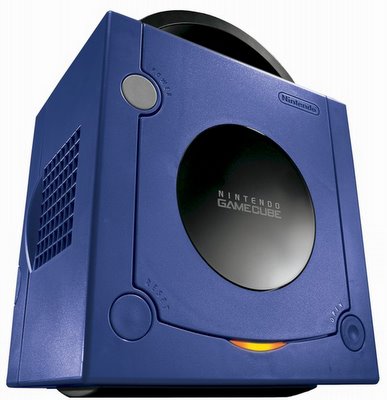It Won't Be Happy Until I'm A Nintendo Zombie
 Don't buy one of these if you want to have a life. I'm not kidding.
Don't buy one of these if you want to have a life. I'm not kidding.Jim and I do celebrate Christmas, after a fashion, though neither of us is a Christian. (We think of it, as I'm sure a lot of people do, as a secular holiday with religious overtones: I like the decorations, the food, and particularly the music, everything else is irrelevant to me.) We occasionally exchange presents, but it's not a prerequisite for the holiday. On Saturday we made the gigantic mistake of buying a GameCube for ourselves for Christmas with the intention of putting it away until Christmas morning; this resolution lasted until approximately ten minutes after we got it home, which is why I didn't get around to posting at all over the weekend. It's going to take a massive display of willpower just to get me out of the house today. (Yes, I know that the GameCube is three years old. I know they're coming out with a bigger-better-faster Revolution next year. Don't care. This one has a zillion games and the price was right.)
But my brain still works, at least the part that hasn't been pureed by Nintendo, and so as I was lying in bed last night waiting for sleep and writing a story in my head, as I always do, one of the words that cropped up was "implacable", which suddenly interested me because I couldn't decide whether or not it was related to "placid". It seemed possible, as the two words have so much in common. What suggested a rift between the words was the "-c-" sound, hard in the first word and soft in the second; I knew it might be a side effect of the different vowels, but something told me that the words had differing roots.
And this did turn out to be the case. In a striking example of parallel development, we have two Latin words, "placere" and "placare", that mean two vaguely similar but also somewhat different different things and so launched two different strains of words. "Placere" means "to please", while "placare" means "to appease". "Placid" means (says the OED) "mild, gentle, calm, peaceful", and the positive form of "implacable", "placable", means (to quote the OED in full) "capable of being, or easy to be, appeased or pacified; mild, gentle, forgiving." See? They both say "mild"!
But they're not the same. "Placere" gave us, through (bien sur) French, "pleasure", "please", "pleasant", "plea", and "plead" (along with, direct from Latin, "complacent"), while "placare" gave us "placate" and "implacable".

0 Comments:
Post a Comment
<< Home